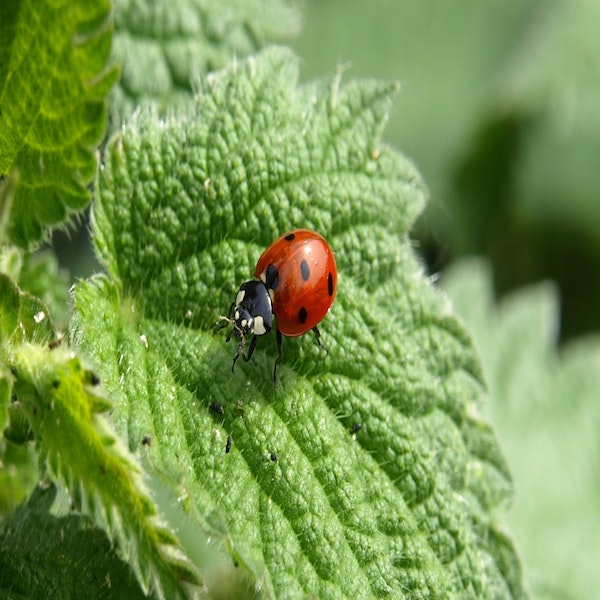6 Friendly Bugs You Want in Your Garden
•Posted on May 14 2020

Did you know certain insects are good for your garden and can actually protect your plants from pests?
The secret to attracting beneficial bugs is simple — just make them feel at home! Attract them with their favorite plants, give them water to drink, and a place to shelter.
These little critters will soon earn their keep by keeping pests at bay, pollinating your crops, and keeping your garden healthy and harmonious — no pesticides required!
1. Ladybug

Long considered symbols of good luck, these polka-dot darlings of the garden are famous for feasting on vast quantities of problem pests at an astonishing pace.
Their larvae, which look like spiny little alligators, can devour up to 40 aphids an hour!
Prey:
- Aphids
- Mites
- Mealybugs
- Insect Eggs and Pupae
- Small Caterpillars
- Colorado Potato Beetles
- Psyllids
- Whiteflies
Attracted by:
- Dandelion
- Dill
- Fern Leaf Flower
- Basket of Gold
2. Ground Beetles

They might look like your garden variety shiny black beetle, but these creepy crawlies love making midnight snacks of all sorts of notorious pests, including slugs, snails and gypsy moth caterpillars.
Ground beetles do most of their eating at night, so if you want to attract them to your garden, your best bet is to provide them with a safe place to sleep during the day.
Prey:
- Slugs
- Snails
- Caterpillars
- Thrips
- Weevils
- Insect Eggs and Larvae
- Ants
- Aphids
- Maggots
- Silverfish
- Wireworms
Attracted by:
- Sheltered areas, like rocks, boards or tree bark.
3. Green Lacewing

At first glance, you would never guess that these dainty creatures are in fact ravenous nocturnal predators that feast on garden pests under the cover of darkness.
They certainly aren't picky about their prey — and that's why gardeners love them! Measuring under a quarter of an inch long with delicate iridescent wings, these lime green lovelies emerge at dusk and are attracted to light.
The eggs they lay dangle off garden leaves on the end of hair-thin stalks, and the insatiably hungry larvae that eventually emerge look like tiny reptiles.
Prey:
- Insect Eggs
- Aphids
- Mealybugs
- Mites
- Whiteflies
- Leafhoppers
- Small Caterpillars
Attracted by:
- Coriander
- Dill
- Angelica
- Golden Marguerite
4. Praying Mantis

As long as you have a few praying mantises living amongst your plants, your pest problems will probably be thing of the past!
These hungry bugs get their name from their two spiky long forelegs, which they use to reach out and grab ahold of a wide variety of unsuspecting prey.
Their swiveling head, funny frog face, and large beady eyes make them one of the more interesting and enjoyable garden companions on this list.
Prey:
- Grasshoppers
- Crickets
- Moths
- Beetles
- Flies
- Caterpillars
Attracted by:
- Cosmos
- Marigolds
- Dill
- Tall Grasses
- Shrubs
5. Braconid Wasp

If you want whatever is munching on your tomatoes to buzz off, bring on braconid wasps!
These tiny non-stinging creatures are the number one enemy of hornworms, which are the number one enemy of garden tomatoes.
The wasp lays its eggs on the bodies of these destructive caterpillars, which are consumed from within as the larvae mature.
Prey:
- Tomato Hornworm (and other Caterpillars)
- Aphids
Attracted by:
- Lemon Balm
- Parsley
- Common Yarrow
- Fern-Leaf Yarrow
6. Earthworm

Though they're technically animals, not insects, earthworms are arguably the most welcome garden guests out there!
These subterranean critters break down compost and other organic matter, excreting nutrient-rich fertilizer. Affectionately nicknamed "nature's plows," they also increase the oxygen and water permeability in your garden soil with every wiggle.
Let's Grow, Together
If you're seeking a chemical-free solution to protect your plants from pests, using companion planting to attract beneficial insects to your garden is the easiest way to promote a harmonious ecosystem.
A healthy garden needs healthy soil, and our organic, eco-friendly, water-soluble fertilizer gives your plants — and all the friendly critters that help them — exactly what they need to thrive.
Shop below to get started.

Related Posts:
- Get the Most From Your Garden With Companion Planting
- 5 Harmful Garden Insects and How to Eliminate Them
- Rodent Roundup: Natural Solutions for Keeping Critters Out of Your Garden
Comments
0 Comments
Leave a Comment